Artificial Intelligence
Here's What Businesses are Doing with Artificial Intelligence
19 September 2017
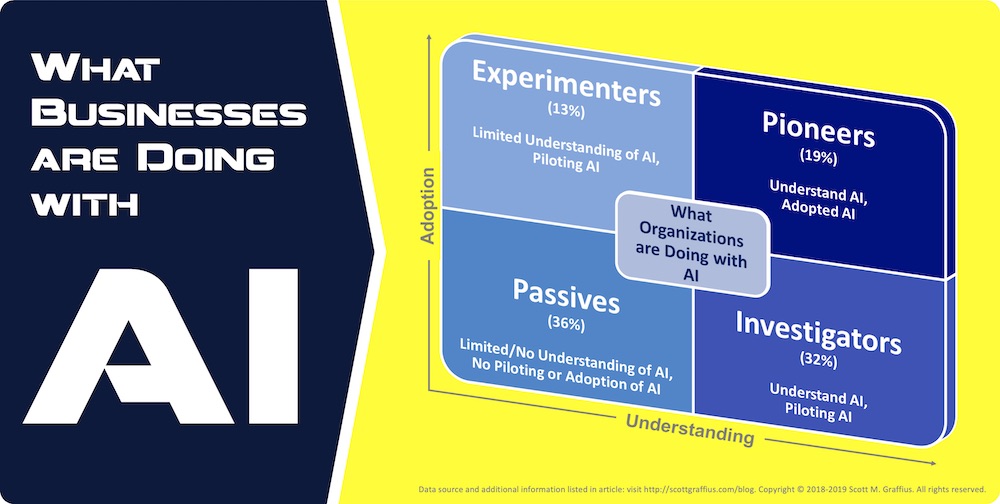
Disruption from artificial intelligence (AI) is here, but many leaders don't have clear expectations about AI or how it fits into their business. This brief article focuses on the disparity in understanding and implementation.
There are four organizational maturity clusters:
- Pioneers (19% of organizations): Businesses that both understand and have incorporated AI into their offerings and internal processes.
- Investigators (32%): Businesses that understand AI but are not deploying it beyond the pilot stage.
- Experimenters (13%): Organizations that are piloting AI without deep understanding.
- Passives (36%): Organizations with limited/no understanding of AI and no piloting/adoption.
Only 19% understand AI and have adopted it. Barriers for the remaining 81% may include issues with business cases, leadership, talent with AI expertise, and technology.

Data source: https://sloanreview.mit.edu/projects/reshaping-business-with-artificial-intelligence.

© Copyright 2017 Scott M. Graffius. All rights reserved. This material may not be published, broadcast, rewritten or redistributed without the express written permission of Scott M. Graffius.

AI is a Team Sport: A Confluence of Diverse Technical and Soft Skills are Crucial for Success
01 May 2023
BY SCOTT M. GRAFFIUS | ScottGraffius.com

Select here to download this article as a PDF.
This article covers the significance of well-rounded AI teams, including how both soft and technical skills are critical and fuel success. It’s informed by Graffius' work on AI projects as well as research and coverage from DARPA, IBM, IEEE, MIT, Microsoft, Software Engineering Institute, Stanford University, United States Artificial Intelligence Institute, and others (all listed in the bibliography section of this article).

Introduction
Artificial Intelligence (AI) has emerged as a transformative force across a growing number of industries, revolutionizing how we live, work, and interact. From autonomous vehicles and virtual assistants to personalized recommendations and medical diagnoses, AI systems have become integral to our daily lives. Behind these cutting-edge, life-changing solutions are AI teams that possess a combination of soft skills—also known as core skills, interpersonal skills, people skills, power skills, transferable skills, or transversal skills—and technical expertise.
This article highlights the synergy between soft skills and technical skills in the world of AI. While technical skills provide the general foundation for AI development, it’s the soft skills that elevate AI projects to new heights. From effective communication and critical thinking to leadership and teamwork, soft skills play a pivotal role in translating technical knowledge and capabilities into real-world applications.
The thesis of this article is that the successful development and application of AI requires a combination of soft skills and technical expertise. Technical competencies alone are not enough. Rather, it’s the combination and integration of soft and technical skills that truly unlocks the power of AI.
Next, this article focuses on the importance of soft skills in the AI landscape, highlighting how they complement and enhance technical abilities. The collaboration between these skill sets drives AI innovation.

Understanding Soft Skills in AI Teams
In the realm of AI, technical expertise often takes center stage. However, soft skills advance the successful outcomes of AI projects, as they facilitate effective communication, foster collaboration, and promote critical thinking. Soft skills are powerful facilitators of success.
Soft skills encompass a range of interpersonal and cognitive abilities that enable teams to work harmoniously, adapt to evolving challenges, and solve complex problems. In the AI landscape, where multidisciplinary teams come together to create innovative solutions, these soft skills are essential.
Effective communication stands at the forefront of soft skills in AI. AI teams must articulate complex technical concepts in a manner that is understandable to diverse stakeholders, including non-technical staff and internal or external customers/users. Clear communication promotes collaboration and ensures alignment of purpose and objectives throughout the AI development lifecycle.
Soft skills such as problem-solving and critical thinking are vital as well. AI teams frequently encounter multifaceted challenges, and it is through these soft skills that teams can identify potential bottlenecks, navigate complexities, and devise innovative solutions. By leveraging critical thinking, AI team members can evaluate different approaches, consider ethical implications, and make informed decisions that shape the development and application of AI systems.
Leadership and teamwork skills are also paramount. AI projects involve team members from diverse backgrounds, including data scientists, engineers, domain experts, designers, and others. Effective leadership enables the coordination of efforts and guides the project towards success. Similarly, teamwork skills foster an environment of trust and respect, promoting synergy among team members and enhancing overall productivity.
Recognizing the importance of soft skills in AI is crucial for fostering a balanced and effective team dynamic. It ensures that AI teams possess the interpersonal and cognitive abilities necessary to bring AI projects to fruition. The integration of soft skills alongside technical expertise sets the stage for a cohesive team capable of tackling complex AI challenges with agility and innovation.
The role of technical skills—including how they intersect with soft skills to create a powerful combination that drives success—are covered next.
The Role of Technical Skills in AI Teams
Technical skills provide the tools and knowledge required to design, build, and implement AI systems. This section explores the role that technical skills play in AI and their specific applications in various stages of AI projects.
Technical skills are essential for AI projects. They enable team members to translate concepts, theories, and algorithms into practical applications. However, technical skills alone are not sufficient for success. The collaborative nature of AI development and the need for a well-rounded AI team—including the synergy between technical skills and soft skills—is covered next.
The Power of Synergy: Soft Skills and Technical Skills in AI Teams
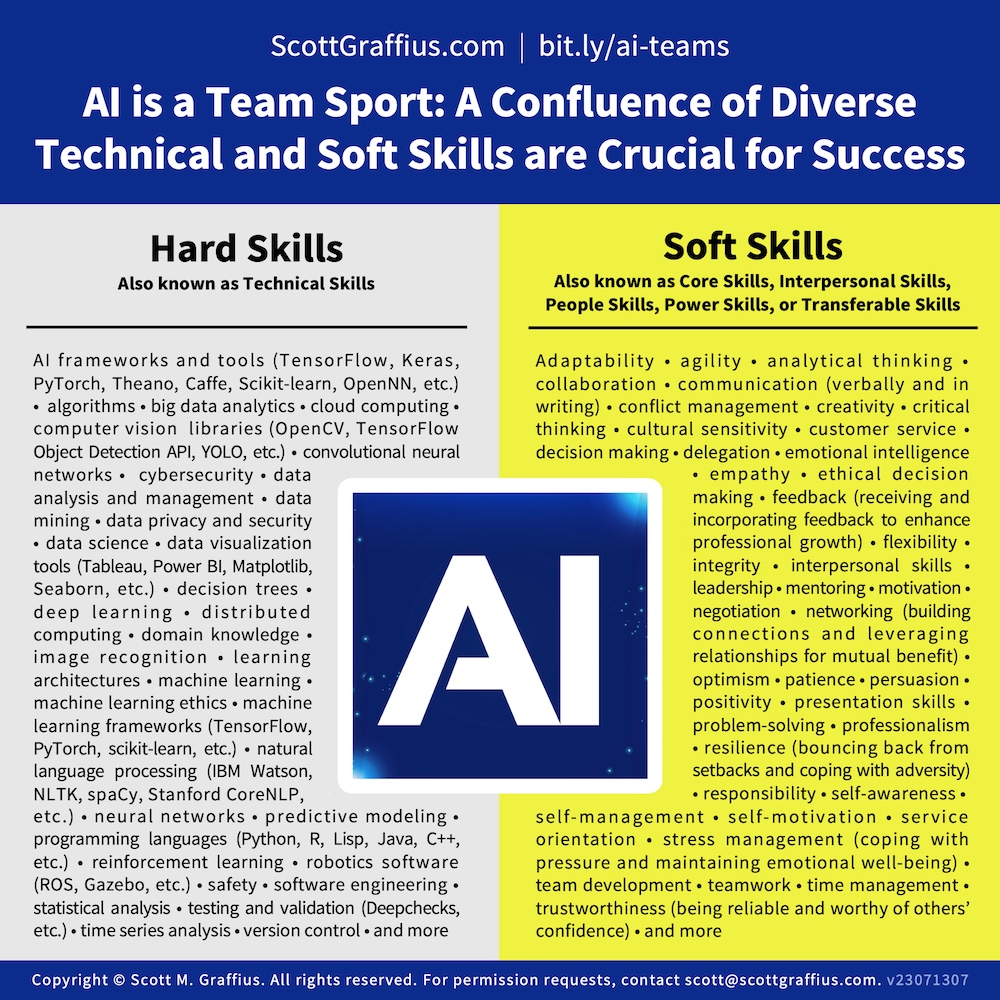
The convergence of soft skills and technical skills is where true innovation and breakthroughs occur. The successful development and application of AI systems rely not only on technical expertise but also on the harmonious integration of soft skills. Here’s some examples of the power of synergy between these skill sets, including how they work together to drive AI advancement:
The synergy between soft skills and technical skills is the catalyst that drives AI projects towards success. It enables AI teams to go beyond technical expertise and develop AI systems that address real-world problems effectively. By embracing a holistic approach that values both soft skills and technical skills, organizations can foster an environment where AI thrives, resulting in innovative solutions that have a positive impact on society.
Strategies for developing and nurturing soft skills are covered next.
Developing and Advancing Soft Skills in AI Teams
AI teams need soft skills to be successful. Organizations and teams should prioritize the development and advancement of these skills. Here are some strategies to enhance soft skills and foster a well-rounded AI workforce:
By implementing these strategies, organizations can cultivate a workforce that excels not only in technical skills but also in the essential soft skills required for AI success. Nurturing well-rounded AI professionals creates a collaborative and adaptive environment, where AI teams can effectively address complex challenges, drive innovation, and deliver impactful solutions.
The next section wraps up this exploration.
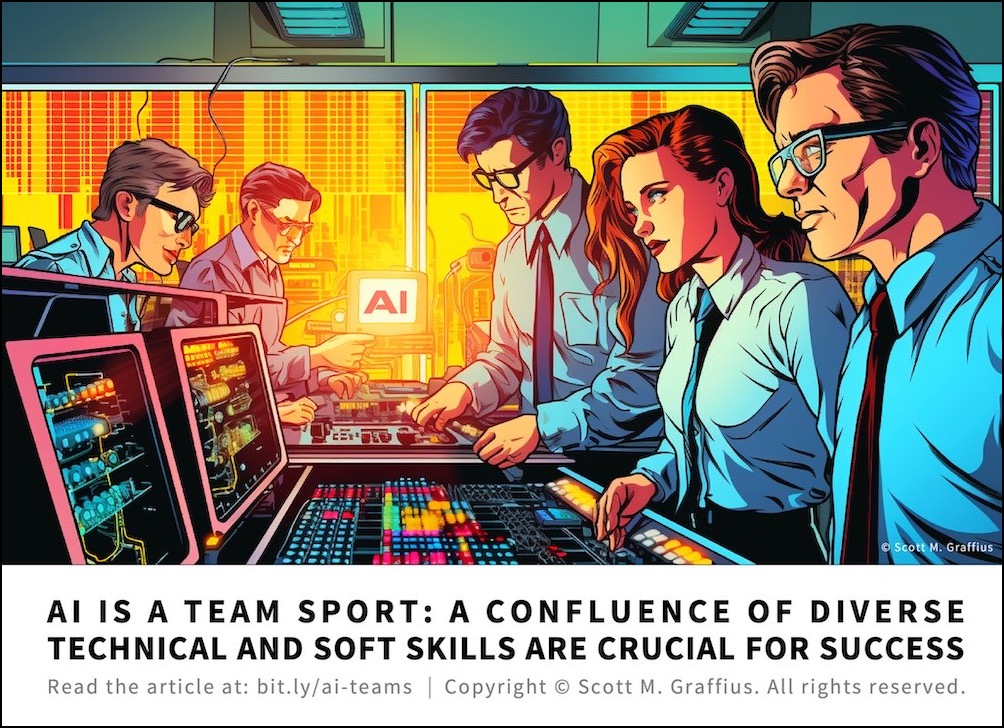

Conclusion
The successful development and application of AI systems rely on the synergy between soft skills and technical skills. While technical expertise forms the foundation, it's the integration of soft skills that elevates AI projects to new heights. Effective communication, collaboration, critical thinking, and leadership are among the key soft skills that enable AI teams to excel.
This article explored the significance of soft skills in AI, emphasizing their role in fostering effective teamwork, problem-solving, and innovation. It also acknowledged the indispensable role of technical skills in AI development, including programming languages, algorithms, data analysis, domain knowledge, and more.
Organizations can create well-rounded AI teams with a holistic set of abilities by embracing the power of synergy between soft skills and technical skills. AI team members with strong soft skills can effectively communicate their ideas, collaborate seamlessly, think critically, and provide leadership that empowers their teams.
To advance soft skills among AI professionals, organizations should invest in training programs, promote interdisciplinary collaboration, encourage continuous learning, and foster mentorship and coaching relationships. These efforts will help AI professionals develop the interpersonal and cognitive abilities necessary to thrive in the dynamic and collaborative AI landscape.
AI is a team sport that thrives on the confluence of soft skills and technical skills. By recognizing and embracing this synergy, organizations can unlock the full potential of AI, delivering innovative solutions that address real-world challenges and have a positive impact on the world.

References/Sources
All of the supplied links were functional when this article was published.

How to Cite This Article
Graffius, Scott M. (2023, May 1). AI is a Team Sport: A Confluence of Diverse Technical and Soft Skills are Crucial for Success. Available at: https://scottgraffius.com/blog/files/successful-ai-teams.html. DOI: 10.13140/RG.2.2.20321.79200.





About Scott M. Graffius

Scott M. Graffius, PMP, SA, CSP-SM, CSP-PO, CSM, CSPO, SFE, ITIL, LSSGB is an agile project management practitioner, consultant, multi-award-winning author, and international keynote speaker. He is the Founder of Exceptional PPM and PMO Solutions™ and subsidiary Exceptional Agility™. He has generated over $1.9 billion of business value in aggregate for Global Fortune 500 businesses and other organizations he has served. Graffius and content from his books, talks, workshops, and more have been featured and used by businesses, professional associations, governments, and universities. Examples include Microsoft, Oracle, Broadcom, Cisco, Gartner, Project Management Institute, IEEE, Qantas, National Academy of Sciences, United States Department of Energy, New Zealand Ministry of Education, Yale University, Tufts University, and others. He has delighted audiences with dynamic and engaging talks and workshops on agile, project management, and technology leadership at 85 conferences and other events across 25 countries.
His full bio is available here.
Connect with Scott on:


About Agile Scrum: Your Quick Start Guide with Step-by-Step Instructions
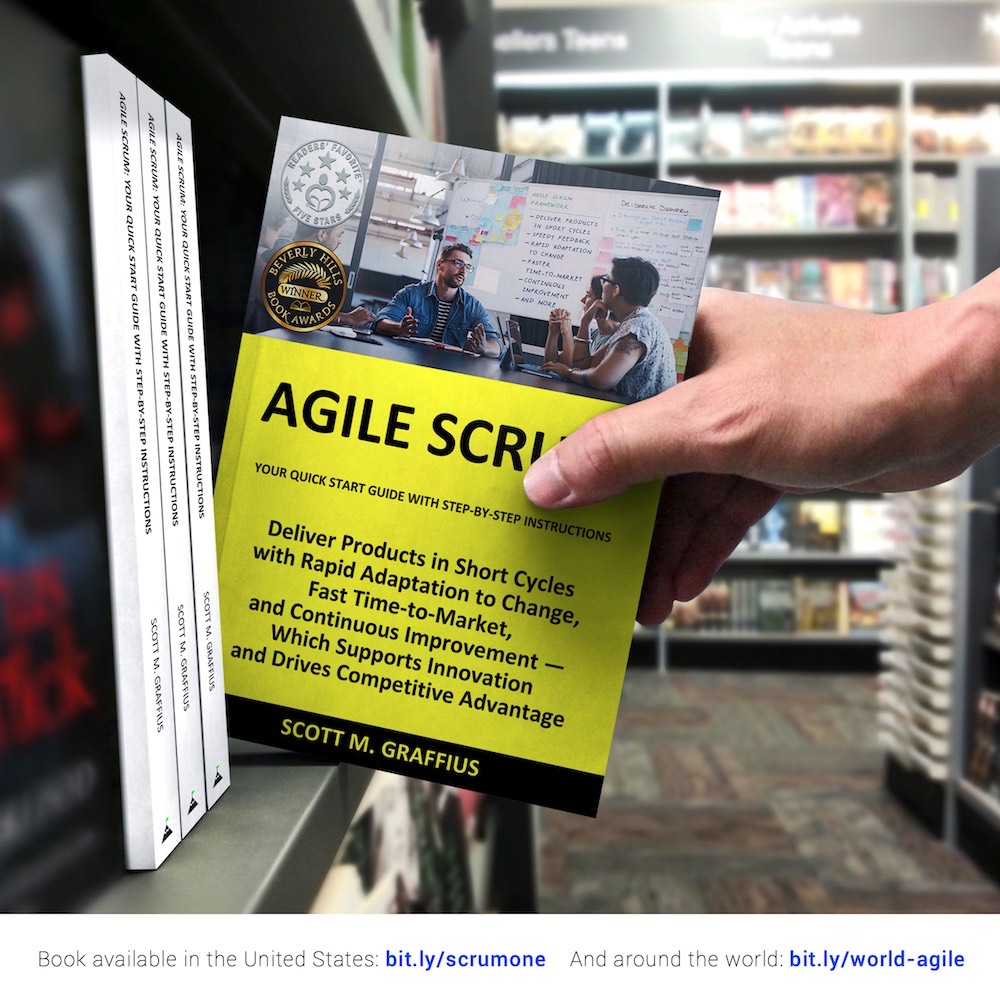
Shifting customer needs are common in today's marketplace. Businesses must be adaptive and responsive to change while delivering an exceptional customer experience to be competitive.
There are a variety of frameworks supporting the development of products and services, and most approaches fall into one of two broad categories: traditional or agile. Traditional practices such as waterfall engage sequential development, while agile involves iterative and incremental deliverables. Organizations are increasingly embracing agile to manage projects, and best meet their business needs of rapid response to change, fast delivery speed, and more.
With clear and easy to follow instructions, the multi award-winning Agile Scrum: Your Quick Start Guide with Step-by-Step Instructions book by Scott M. Graffius (Chris Hare and Colin Giffen, Technical Editors) helps the reader:
Hailed by Literary Titan as “the book highlights the versatility of Scrum beautifully.”
Winner of 17 first place awards.
Agile Scrum: Your Quick Start Guide with Step-by-Step Instructions is available in paperback and ebook/Kindle in the United States and around the world. Some links by country follow.

About Agile Transformation: A Brief Story of How an Entertainment Company Developed New Capabilities and Unlocked Business Agility to Thrive in an Era of Rapid Change
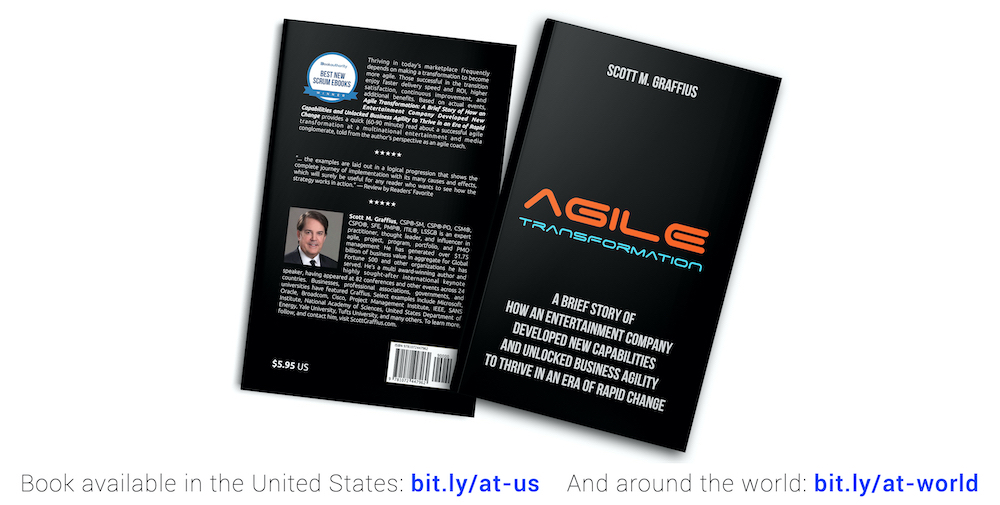
Thriving in today's marketplace frequently depends on making a transformation to become more agile. Those successful in the transition enjoy faster delivery speed and ROI, higher satisfaction, continuous improvement, and additional benefits.
Based on actual events, Agile Transformation: A Brief Story of How an Entertainment Company Developed New Capabilities and Unlocked Business Agility to Thrive in an Era of Rapid Change provides a quick (60-90 minute) read about a successful agile transformation at a multinational entertainment and media company, told from the author's perspective as an agile coach.
The award-winning book by Scott M. Graffius is available in paperback and ebook/Kindle in the United States and around the world. Some links by country follow.

The short URL for this article is: https://bit.ly/ai-teams
© Copyright 2023 Scott M. Graffius. All rights reserved. This material may not be published, broadcast, rewritten or redistributed without the express written permission of Scott M. Graffius.


Select here to download this article as a PDF.
This article covers the significance of well-rounded AI teams, including how both soft and technical skills are critical and fuel success. It’s informed by Graffius' work on AI projects as well as research and coverage from DARPA, IBM, IEEE, MIT, Microsoft, Software Engineering Institute, Stanford University, United States Artificial Intelligence Institute, and others (all listed in the bibliography section of this article).

Introduction
Artificial Intelligence (AI) has emerged as a transformative force across a growing number of industries, revolutionizing how we live, work, and interact. From autonomous vehicles and virtual assistants to personalized recommendations and medical diagnoses, AI systems have become integral to our daily lives. Behind these cutting-edge, life-changing solutions are AI teams that possess a combination of soft skills—also known as core skills, interpersonal skills, people skills, power skills, transferable skills, or transversal skills—and technical expertise.
This article highlights the synergy between soft skills and technical skills in the world of AI. While technical skills provide the general foundation for AI development, it’s the soft skills that elevate AI projects to new heights. From effective communication and critical thinking to leadership and teamwork, soft skills play a pivotal role in translating technical knowledge and capabilities into real-world applications.
The thesis of this article is that the successful development and application of AI requires a combination of soft skills and technical expertise. Technical competencies alone are not enough. Rather, it’s the combination and integration of soft and technical skills that truly unlocks the power of AI.
Next, this article focuses on the importance of soft skills in the AI landscape, highlighting how they complement and enhance technical abilities. The collaboration between these skill sets drives AI innovation.

Understanding Soft Skills in AI Teams
In the realm of AI, technical expertise often takes center stage. However, soft skills advance the successful outcomes of AI projects, as they facilitate effective communication, foster collaboration, and promote critical thinking. Soft skills are powerful facilitators of success.
Soft skills encompass a range of interpersonal and cognitive abilities that enable teams to work harmoniously, adapt to evolving challenges, and solve complex problems. In the AI landscape, where multidisciplinary teams come together to create innovative solutions, these soft skills are essential.
Effective communication stands at the forefront of soft skills in AI. AI teams must articulate complex technical concepts in a manner that is understandable to diverse stakeholders, including non-technical staff and internal or external customers/users. Clear communication promotes collaboration and ensures alignment of purpose and objectives throughout the AI development lifecycle.
Soft skills such as problem-solving and critical thinking are vital as well. AI teams frequently encounter multifaceted challenges, and it is through these soft skills that teams can identify potential bottlenecks, navigate complexities, and devise innovative solutions. By leveraging critical thinking, AI team members can evaluate different approaches, consider ethical implications, and make informed decisions that shape the development and application of AI systems.
Leadership and teamwork skills are also paramount. AI projects involve team members from diverse backgrounds, including data scientists, engineers, domain experts, designers, and others. Effective leadership enables the coordination of efforts and guides the project towards success. Similarly, teamwork skills foster an environment of trust and respect, promoting synergy among team members and enhancing overall productivity.
Recognizing the importance of soft skills in AI is crucial for fostering a balanced and effective team dynamic. It ensures that AI teams possess the interpersonal and cognitive abilities necessary to bring AI projects to fruition. The integration of soft skills alongside technical expertise sets the stage for a cohesive team capable of tackling complex AI challenges with agility and innovation.
The role of technical skills—including how they intersect with soft skills to create a powerful combination that drives success—are covered next.
The Role of Technical Skills in AI Teams
Technical skills provide the tools and knowledge required to design, build, and implement AI systems. This section explores the role that technical skills play in AI and their specific applications in various stages of AI projects.
- Programming Languages and Algorithms: Proficiency in programming languages such as Python, Java, or R is essential. These languages enable team members to write efficient code, manipulate and analyze data, and implement machine learning algorithms. Understanding algorithms, from classic ones like linear regression to cutting-edge deep learning models, empowers AI professionals to leverage mathematical principles and statistical techniques to train and optimize AI systems.
- Data Analysis and Management: AI relies on data, making data analysis and management skills crucial. AI team members need to be adept at collecting, cleaning, and preprocessing data, ensuring its quality and relevance. They must possess the knowledge of statistical methods, data visualization techniques, and data engineering practices to extract insights from complex datasets and prepare them for AI model training.
- Machine Learning and Neural Networks: Technical skills in machine learning are at the heart of AI systems. Understanding machine learning algorithms, such as decision trees, support vector machines, or convolutional neural networks, enables AI team members to create models that can learn from data and make intelligent predictions or decisions. Expertise in neural networks and deep learning architectures equips professionals with the ability to develop complex models capable of handling tasks like image recognition, natural language processing, and reinforcement learning.
- AI Frameworks and Tools: Proficiency in AI frameworks and tools (such as TensorFlow, Keras, PyTorch, Caffe, Scikit-learn, and others) are essential for building AI systems efficiently. These frameworks provide pre-built modules, libraries, and APIs that simplify the implementation of AI algorithms and models. Technical skills in utilizing these tools effectively enable AI team members to accelerate the development process, streamline model training, and optimize system performance.
- Domain Knowledge and Application-Specific Skills: Technical skills also encompass domain knowledge and application-specific expertise. Understanding the nuances of the industry or problem domain in which AI is being applied allows professionals to tailor AI solutions to meet specific requirements. For example, healthcare-focused AI projects may require knowledge of medical terminologies and regulatory considerations, while AI solutions for financial services may demand expertise in risk assessment and fraud detection.
Technical skills are essential for AI projects. They enable team members to translate concepts, theories, and algorithms into practical applications. However, technical skills alone are not sufficient for success. The collaborative nature of AI development and the need for a well-rounded AI team—including the synergy between technical skills and soft skills—is covered next.
The Power of Synergy: Soft Skills and Technical Skills in AI Teams

The convergence of soft skills and technical skills is where true innovation and breakthroughs occur. The successful development and application of AI systems rely not only on technical expertise but also on the harmonious integration of soft skills. Here’s some examples of the power of synergy between these skill sets, including how they work together to drive AI advancement:
- Effective Communication and Technical Expertise: Communication bridges the gap between AI professionals and others who may not possess technical backgrounds. AI experts with strong communication skills can articulate complex technical concepts in plain English, ensuring that everyone involved understands the goals, challenges, and progress of the project. By effectively conveying ideas, AI professionals foster collaboration, gather valuable insights, and create a shared vision for AI initiatives.
- Collaboration and Problem-Solving: Collaboration is at the core of AI development, and soft skills such as teamwork, empathy, and active listening facilitate effective collaboration among diverse team members. AI teams with strong collaboration skills can effectively pool their technical expertise, brainstorm ideas, and solve complex problems together. By leveraging their collective intelligence and diverse perspectives, AI teams can overcome challenges, refine AI models, and optimize the performance of AI solutions.
- Critical Thinking and Technical Innovation: Critical thinking, coupled with technical expertise, leads to innovative AI solutions. AI professionals with strong critical thinking skills can evaluate different approaches, challenge assumptions, and identify potential shortcomings or biases in AI models. They can think creatively to address issues such as data biases or fairness concerns, ensuring that AI systems are developed responsibly and ethically.
- Leadership and Team Empowerment: Effective leadership in AI projects involves establishing and maintaining a collaborative and inclusive environment, empowering team members, and harnessing their full potential. AI leaders with exceptional interpersonal abilities can inspire and motivate their team, foster a culture of continuous learning, and provide guidance in navigating complex technical challenges. They encourage interdisciplinary collaboration, respect diverse perspectives, and drive the team towards achieving AI objectives.
The synergy between soft skills and technical skills is the catalyst that drives AI projects towards success. It enables AI teams to go beyond technical expertise and develop AI systems that address real-world problems effectively. By embracing a holistic approach that values both soft skills and technical skills, organizations can foster an environment where AI thrives, resulting in innovative solutions that have a positive impact on society.
Strategies for developing and nurturing soft skills are covered next.
Developing and Advancing Soft Skills in AI Teams
AI teams need soft skills to be successful. Organizations and teams should prioritize the development and advancement of these skills. Here are some strategies to enhance soft skills and foster a well-rounded AI workforce:
- Training Programs and Workshops: Implement specialized training programs and workshops focused on enhancing soft skills. Offer courses in effective communication, leadership (including how to navigate the phases of team development), problem-solving, critical thinking, and collaboration. These programs can provide AI professionals with the necessary tools and techniques to effectively apply soft skills in their work.
- Interdisciplinary Collaboration and Knowledge Sharing: Encourage interdisciplinary collaboration by creating opportunities for AI team members to work alongside experts from diverse fields such as psychology, design, ethics, and business. This collaboration allows for cross-pollination of ideas, encourages different perspectives, and broadens the skill set of AI teams. Foster a culture of knowledge sharing, where professionals can learn from each other and leverage their collective experiences and expertise.
- Real-World Project Engagement: Provide AI team members with opportunities to work on (other) real-world projects, allowing them to apply their soft skills in practical scenarios. Engaging in projects that involve interaction with clients, end-users, and stakeholders helps AI team members develop effective communication, problem-solving, and teamwork skills.
- Continuous Learning and Professional Development: Encourage AI team members to engage in continuous learning and professional development activities. This can include attending conferences, participating in webinars, reading industry publications, and pursuing certifications in relevant areas. Promote a growth mindset among AI team members, emphasizing the importance of lifelong learning and staying current with the latest developments in both technical and soft skills domains.
- Mentorship and Coaching: Establish mentorship and coaching programs where experienced AI professionals guide and support individuals with less experience. Mentors can provide valuable insights, share their experiences, and offer guidance on developing skills. Regular feedback and coaching sessions help AI professionals identify areas for improvement and provide targeted development opportunities.
By implementing these strategies, organizations can cultivate a workforce that excels not only in technical skills but also in the essential soft skills required for AI success. Nurturing well-rounded AI professionals creates a collaborative and adaptive environment, where AI teams can effectively address complex challenges, drive innovation, and deliver impactful solutions.
The next section wraps up this exploration.


Conclusion
The successful development and application of AI systems rely on the synergy between soft skills and technical skills. While technical expertise forms the foundation, it's the integration of soft skills that elevates AI projects to new heights. Effective communication, collaboration, critical thinking, and leadership are among the key soft skills that enable AI teams to excel.
This article explored the significance of soft skills in AI, emphasizing their role in fostering effective teamwork, problem-solving, and innovation. It also acknowledged the indispensable role of technical skills in AI development, including programming languages, algorithms, data analysis, domain knowledge, and more.
Organizations can create well-rounded AI teams with a holistic set of abilities by embracing the power of synergy between soft skills and technical skills. AI team members with strong soft skills can effectively communicate their ideas, collaborate seamlessly, think critically, and provide leadership that empowers their teams.
To advance soft skills among AI professionals, organizations should invest in training programs, promote interdisciplinary collaboration, encourage continuous learning, and foster mentorship and coaching relationships. These efforts will help AI professionals develop the interpersonal and cognitive abilities necessary to thrive in the dynamic and collaborative AI landscape.
AI is a team sport that thrives on the confluence of soft skills and technical skills. By recognizing and embracing this synergy, organizations can unlock the full potential of AI, delivering innovative solutions that address real-world challenges and have a positive impact on the world.

References/Sources
All of the supplied links were functional when this article was published.
- Accenture (2023, March 30). Accenture Technology Vision 2023: Generative AI to Usher in a Bold New Future for Business, Merging Physical and Digital Worlds. Available at: https://newsroom.accenture.com/news/accenture-technology-vision-2023-generative-ai-to-usher-in-a-bold-new-future-for-business-merging-physical-and-digital-worlds.htm.
- Alsever, Jennifer (2020, January 20). Medicine by Machine: Is A.I. the Cure for the World’s Ailing Drug Industry? Fortune. Available at: https://fortune.com/longform/ai-artificial-intelligence-medicine-healthcare-pharmaceutical-industry.
- Berlin School of Business and Innovation (2022, September 22). How Do Technical Abilities Combined with Leadership Skills Fuel Career Growth? Available at: https://www.berlinsbi.com/blog/career-advice/how-do-technical-abilities-combined-with-leadership-skills-fuel-career-growth.
- Bhatti, Shawaiz, Demir, Mustafa, Cooke, Nancy J., & Johnson, Craig J. (2021). Assessing Communication and Trust in an AI Teammate in a Dynamic Task Environment. In: 2021 IEEE 2nd International Conference on Human-Machine Systems (ICHMS): 1–6. DOI: 10.1109/ICHMS53169.2021.9582626.
- Brooks, David (2023, February 2). In the Age of A.I., Major in Being Human. The New York Times. Available at: https://www.nytimes.com/2023/02/02/opinion/ai-human-education.html.
- Crampton, Natasha (2021, January 19). The Building Blocks of Microsoft’s Responsible AI Program. Microsoft. Available at: https://blogs.microsoft.com/on-the-issues/2021/01/19/microsoft-responsible-ai-program.
- Dolev, Niva, & Itzkovich, Yariv (2020). In the AI Era, Soft Skills are the New Hard Skills. In: Artificial Intelligence and Its Impact on Business, pp. 55-77. Charlotte, NC: Information Age Publishing.
- Dzombak, Rachel, & Palat, Jay (2021, August 30). 5 Ways to Start Growing an AI-Ready Workforce. Pittsburgh, PA: Software Engineering Institute, Carnegie Mellon University.
- Elliott, Joshua (n.d.). Artificial Social Intelligence for Successful Teams (ASIST). Arlington, VA: Defense Advanced Research Projects Agency (DARPA).
- Fountaine, Tim, McCarthy, Brian, & Saleh, Tamim (2019). Building the AI-Powered Organization. Harvard Business Review, 97 (4): 62–73.
- Gartner (2020, December 15). How to Staff Your AI Team. Available at: https://www.gartner.com/smarterwithgartner/how-to-staff-your-ai-team.
- Gorman, Austin (2023, April 27). How to Strengthen Your Soft Skills for AI and the Future of Work. Fast Company. Available at: https://www.fastcompany.com/90887540/how-to-strengthen-your-soft-skills-for-ai-and-the-future-of-work.
- GovExec Events (2020, July 1). Human Machine Team: The Intersection of Diverse Skill Sets [Video]. Defense One. Available at: https://www.youtube.com/watch?v=93wbNLKpbxg&t=1s.
- Graffius, Scott M. (2023, May 1). Fueling the Development of Innovative and Life-Changing AI Solutions [Presentation]. Talk delivered to an audience of Technology professionals (including Data Scientists, Machine Learning Engineers, Data Engineers, AI Researchers, Project Managers, Business Analysts, UX Designers, Software Developers, Cloud Architects, Data Privacy and Security Specialists, and others involved or interested in AI) at a private event in Mountain View, California, United States. Digital Object Identifier (DOI): 10.13140/RG.2.2.27956.73601. DOI link: https://dx.doi.org/10.13140/RG.2.2.27956.73601.
- Graffius, Scott M. (2023, April 26). The Science of High-Performance Teams [Presentation]. Talk delivered at the DevOps Institute’s SKILup Day 2023 Conference. Digital Object Identifier (DOI): 10.13140/RG.2.2.15888.28169. DOI link: https://dx.doi.org/10.13140/RG.2.2.15888.28169.
- Graffius, Scott M. (2023, January 9). Use the Phases of Team Development (Based on Bruce W. Tuckman's Model of Forming, Storming, Norming, Performing, and Adjourning) to Help Teams Grow and Advance: 2023 Update. Available at: https://scottgraffius.com. Digital Object Identifier (DOI): 10.13140/RG.2.2.10720.35846. DOI link: https://dx.doi.org/10.13140/RG.2.2.10720.35846.
- Graffius, Scott M. (2022, May 13). Want Happier and More Productive DevOps Teams? [Presentation]. Talk delivered at DevOpsDays Geneva, Switzerland 2022 Conference. Digital Object Identifier (DOI): 10.13140/RG.2.2.22252.85127. DOI link: https://dx.doi.org/10.13140/RG.2.2.22252.85127.
- Graffius, Scott M. (2021, October 5). Navigate the Phases of Team Development with Speed and Agility for Happier and More Productive Teams [Presentation]. Talk delivered at the Institute of Electrical and Electronics Engineers IEEE Day 2021 Conference. Digital Object Identifier (DOI): 10.13140/RG.2.2.20055.19365. DOI link: https://dx.doi.org/10.13140/RG.2.2.20055.19365.
- Graffius, Scott M. (2021, February 20). But First, the Team! [Presentation]. Talk delivered at the Brno, Czech Republic DevConf.CZ 2021 Conference. Digital Object Identifier (DOI): 10.13140/RG.2.2.29016.72964. DOI link: https://dx.doi.org/10.13140/RG.2.2.29016.72964.
- IBM (2019, September 26). Assemble the Team to Support a Data-Driven Project. Available at: https://www.ibm.com/garage/method/practices/culture/assemble-team-for-data-driven-project.
- IBM (2019). Everyday Ethics for Artificial Intelligence. Available at: https://www.ibm.com/watson/assets/duo/pdf/everydayethics.pdf.
- Institute of Electrical and Electronics Engineers (IEEE) (2021, November 8). The IEEE Global Initiative on Ethics of Autonomous and Intelligent Systems. Available at: https://standards.ieee.org/industry-connections/ec/autonomous-systems.html.
- Kenan Institute (2023, February 20). The Must-Have Skills in the Era of Artificial Intelligence: How AI’s Democratization Will Impact Workers. Available at: https://kenaninstitute.unc.edu/commentary/the-must-have-skills-in-the-era-of-artificial-intelligence-how-ais-democratization-will-impact-workers.
- Lindzon, Jared (2017, February 28). How AI is Changing the Way Companies are Organized. Fast Company. Available at: https://www.fastcompany.com/3068492/how-ai-is-changing-the-way-companies-are-organized.
- Marr, Bernard (2023, March 20). Beyond The Hype: What You Really Need to Know About AI In 2023. Forbes. Available at: https://www.forbes.com/sites/bernardmarr/2023/03/20/beyond-the-hype-what-you-really-need-to-know-about-ai-in-2023.
- Massachusetts Institute of Technology (MIT) Lincoln Laboratory (2023, January 17). Human-AI Performance Incubator. Available at: https://www.ll.mit.edu/r-d/projects/human-ai-performance-incubator.
- Massachusetts Institute of Technology (MIT) (2021, January). Cognitive Science as a New People Science for the Future of Work. Available at: https://workofthefuture.mit.edu/wp-content/uploads/2021/01/2021-Research-Brief-Polli-Kassir-Dolphin-Baker-Gabrieli.pdf.
- Massachusetts Institute of Technology (MIT) Sloan (2019, October 15). Winning With AI. MIT Sloan Management Review and Boston Consulting Group. Available at: https://sloanreview.mit.edu/projects/winning-with-ai.
- McNeese, Nathan J., Demir, Mustafa, Chiou, Erin K., & Cooke, Nancy J. (2021). Trust and Team Performance in Human–Autonomy Teaming. International Journal of Electronic Commerce, 25 (1): 51–72. DOI: 10.1080/10864415.2021.1846854.
- Mearian, Lucas (2023, February 24). Skills-Based Hiring Continues to Rise as Degree Requirements Fade. Computerworld. Available at: https://www.computerworld.com/article/3689170/skills-based-hiring-continues-to-rise-as-degree-requirements-fade.html.
- Microsoft (2019, June 15). Is the Latest Technology the Key to Your Team’s Success, or is There Something Else? Available at: https://devblogs.microsoft.com/premier-developer/is-the-latest-technology-the-key-to-your-teams-success-or-is-there-something-else.
- New South Wales Technical and Further Education Commission (TAFE NSW) (2019). Soft vs. Hard Skills: Why Successful Australian Businesses Need Both. Ultimo, New South Wales: TAFE NSW.
- O’Dea, Blathnaid (2023, February 17). These are the Top Skills AI and Analytics Professionals Need. Silicon Republic. Available at: https://www.siliconrepublic.com/advice/top-skills-ai-data-analytics-professionals-need.
- Organization for Economic Cooperation and Development (OECD) (n.d.). OECD Programme on AI in Work, Innovation, Productivity and Skills. Available at: https://oecd.ai/en/work-innovation-productivity-skills/key-themes/skills.
- Oswald, Andrew. J., Proto, Eugenio, & Sgroi, Daniel (2015). Happiness and Productivity. Journal of Labor Economics, 33 (4): 789-822.
- Project Management Institute (2020, March 10). Tomorrow's Teams Today: The Future of Teaming: Creative, Collaborative and Agile. Pulse of the Profession. Available at: https://www.pmi.org/learning/library/pulse-indepth-tomorrows-teams-today-11941.
- PwC (2017). Sizing the Prize: What’s the Real Value of AI for Your Business and How Can You Capitalise? PwC’s Global Artificial Intelligence Study: Exploiting the AI Revolution. Available at: https://www.pwc.com/gx/en/issues/data-and-analytics/publications/artificial-intelligence-study.html.
- Rayside, Derek (Ed.) (2023, March 29). Software Engineering Capstone Design Project Handbook (2023 Edition). Waterloo, Ontario, Canada: University of Waterloo.
- Romsey, Joseph (2020, November 30). 5 Tips to Help Workers Upskill and Adapt to Artificial Intelligence. Society for Human Resource Management (SHRM). Available at: https://www.shrm.org/resourcesandtools/hr-topics/technology/pages/how-hr-can-help-workers-upskill-and-adapt-to-artificial-intelligence-5-tips.aspx.
- Stanford University (2019, September). Gathering Strength, Gathering Storms. Stanford, CA: Stanford University.
- Tredinnick, Luke (2017). Artificial Intelligence and Professional Roles. Business Information Review, 34 (1): 37–41.
- Ungerleider, Neal (2023, January 1). AI and Jobs: The Human Angle. Available at: https://www.sap.com/denmark/insights/viewpoints/ai-jobs-human-angle.html.
- United Nations Educational, Scientific and Cultural Organization (UNESCO) (2021, July 2). AI Ethics: Another Step Closer to the Adoption of UNESCO’s Recommendation. Available at: https://en.unesco.org/news/ai-ethics-another-step-closer-adoption-unescos-recommendation-0.
- United States Artificial Intelligence Institute (USAII) (2022). Factsheet: Fast-Track Your Artificial Intelligence Career in 2023. Stamford, CT: USAII.
- United States Congress Committee on Science, Space, and Technology (2019, September 24). Artificial Intelligence and the Future of Work. Report for the One Hundred Sixteenth Congress. Available at: https://www.congress.gov/116/chrg/CHRG-116hhrg37740/CHRG-116hhrg37740.pdf.
- University of Leeds (2023, March 2). The Top 5 AI Skills You Need to Land a Job in Artificial Intelligence. Available at: https://pg-online.leeds.ac.uk/blogs/5-skills-needed-for-ai.
- World Manufacturing Foundation (2020). 2020 World Manufacturing Report: Manufacturing in the Age of Artificial Intelligence. Available at: https://worldmanufacturing.org/wp-content/uploads/WorldManufacturingForum2020_Report.pdf.

How to Cite This Article
Graffius, Scott M. (2023, May 1). AI is a Team Sport: A Confluence of Diverse Technical and Soft Skills are Crucial for Success. Available at: https://scottgraffius.com/blog/files/successful-ai-teams.html. DOI: 10.13140/RG.2.2.20321.79200.



About Scott M. Graffius

Scott M. Graffius, PMP, SA, CSP-SM, CSP-PO, CSM, CSPO, SFE, ITIL, LSSGB is an agile project management practitioner, consultant, multi-award-winning author, and international keynote speaker. He is the Founder of Exceptional PPM and PMO Solutions™ and subsidiary Exceptional Agility™. He has generated over $1.9 billion of business value in aggregate for Global Fortune 500 businesses and other organizations he has served. Graffius and content from his books, talks, workshops, and more have been featured and used by businesses, professional associations, governments, and universities. Examples include Microsoft, Oracle, Broadcom, Cisco, Gartner, Project Management Institute, IEEE, Qantas, National Academy of Sciences, United States Department of Energy, New Zealand Ministry of Education, Yale University, Tufts University, and others. He has delighted audiences with dynamic and engaging talks and workshops on agile, project management, and technology leadership at 85 conferences and other events across 25 countries.
His full bio is available here.
Connect with Scott on:


About Agile Scrum: Your Quick Start Guide with Step-by-Step Instructions

Shifting customer needs are common in today's marketplace. Businesses must be adaptive and responsive to change while delivering an exceptional customer experience to be competitive.
There are a variety of frameworks supporting the development of products and services, and most approaches fall into one of two broad categories: traditional or agile. Traditional practices such as waterfall engage sequential development, while agile involves iterative and incremental deliverables. Organizations are increasingly embracing agile to manage projects, and best meet their business needs of rapid response to change, fast delivery speed, and more.
With clear and easy to follow instructions, the multi award-winning Agile Scrum: Your Quick Start Guide with Step-by-Step Instructions book by Scott M. Graffius (Chris Hare and Colin Giffen, Technical Editors) helps the reader:
- Implement and use the most popular agile framework―Scrum;
- Deliver products in short cycles with rapid adaptation to change, fast time-to-market, and continuous improvement; and
- Support innovation and drive competitive advantage.
Hailed by Literary Titan as “the book highlights the versatility of Scrum beautifully.”
Winner of 17 first place awards.
Agile Scrum: Your Quick Start Guide with Step-by-Step Instructions is available in paperback and ebook/Kindle in the United States and around the world. Some links by country follow.
- 🇧🇷 Brazil
- 🇨🇦 Canada
- 🇨🇿 Czech Republic
- 🇩🇰 Denmark
- 🇫🇮 Finland
- 🇫🇷 France
- 🇩🇪 Germany
- 🇬🇷 Greece
- 🇭🇺 Hungary
- 🇮🇳 India
- 🇮🇪 Ireland
- 🇮🇱 Israel
- 🇮🇹 Italy
- 🇯🇵 Japan
- 🇱🇺 Luxembourg
- 🇲🇽 Mexico
- 🇳🇱 Netherlands
- 🇳🇿 New Zealand
- 🇳🇴 Norway
- 🇪🇸 Spain
- 🇸🇪 Sweden
- 🇨🇭 Switzerland
- 🇦🇪 UAE
- 🇬🇧 United Kingdom
- 🇺🇸 United States

About Agile Transformation: A Brief Story of How an Entertainment Company Developed New Capabilities and Unlocked Business Agility to Thrive in an Era of Rapid Change

Thriving in today's marketplace frequently depends on making a transformation to become more agile. Those successful in the transition enjoy faster delivery speed and ROI, higher satisfaction, continuous improvement, and additional benefits.
Based on actual events, Agile Transformation: A Brief Story of How an Entertainment Company Developed New Capabilities and Unlocked Business Agility to Thrive in an Era of Rapid Change provides a quick (60-90 minute) read about a successful agile transformation at a multinational entertainment and media company, told from the author's perspective as an agile coach.
The award-winning book by Scott M. Graffius is available in paperback and ebook/Kindle in the United States and around the world. Some links by country follow.
- 🇦🇺 Australia
- 🇦🇹 Austria
- 🇧🇷 Brazil
- 🇨🇦 Canada
- 🇨🇿 Czech Republic
- 🇩🇰 Denmark
- 🇫🇮 Finland
- 🇫🇷 France
- 🇩🇪 Germany
- 🇬🇷 Greece
- 🇮🇳 India
- 🇮🇪 Ireland
- 🇯🇵 Japan
- 🇱🇺 Luxembourg
- 🇲🇽 Mexico
- 🇳🇱 Netherlands
- 🇳🇿 New Zealand
- 🇪🇸 Spain
- 🇸🇪 Sweden
- 🇨🇭 Switzerland
- 🇦🇪 United Arab Emirates
- 🇬🇧 United Kingdom
- 🇺🇸 United States

The short URL for this article is: https://bit.ly/ai-teams
© Copyright 2023 Scott M. Graffius. All rights reserved. This material may not be published, broadcast, rewritten or redistributed without the express written permission of Scott M. Graffius.

Scott M. Graffius Speaking at Quantum Computing Conference
31 May 2023
BY SCOTT M. GRAFFIUS | ScottGraffius.com
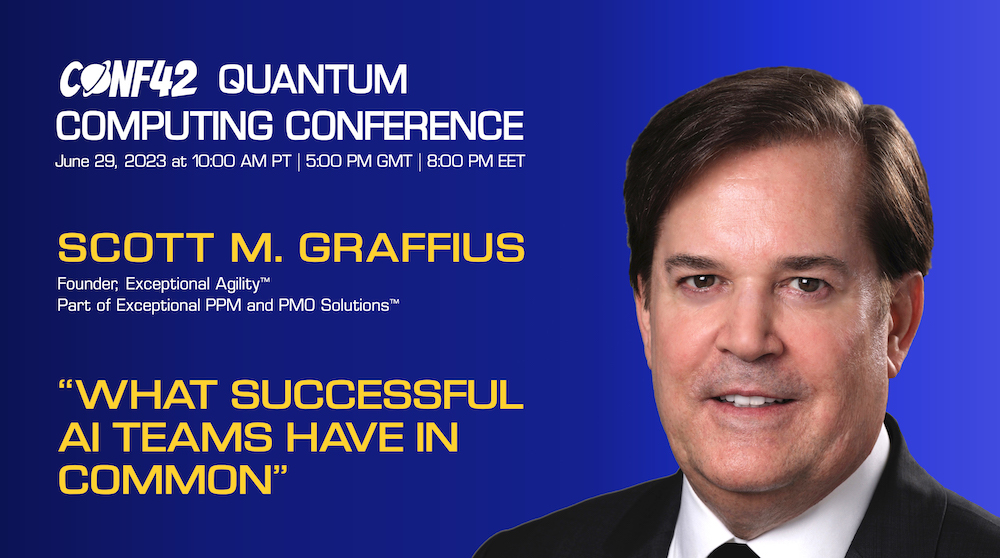
Scott M. Graffius has delivered 86 talks and workshops at conferences and other events across 25 countries. His newest engagement will be at the Conf42 Quantum Computing 2023 Conference, where he'll present “What Successful AI Teams Have in Common.” The talk draws from his work on AI projects as well as research from the Association for the Advancement of Artificial Intelligence, Google, IBM, IEEE, Microsoft, MIT, Software Engineering Institute, United States Artificial Intelligence Institute, and many others.
The conference also includes talks by:
Details ↴
📍 Watch the Quantum Computing Conference online
🗓 June 29, 2023 at 10:00 a.m. PT | 5:00 p.m. GMT | 8:00 p.m. EET
🎟 Subscribe to watch at: https://bit.ly/1-signup
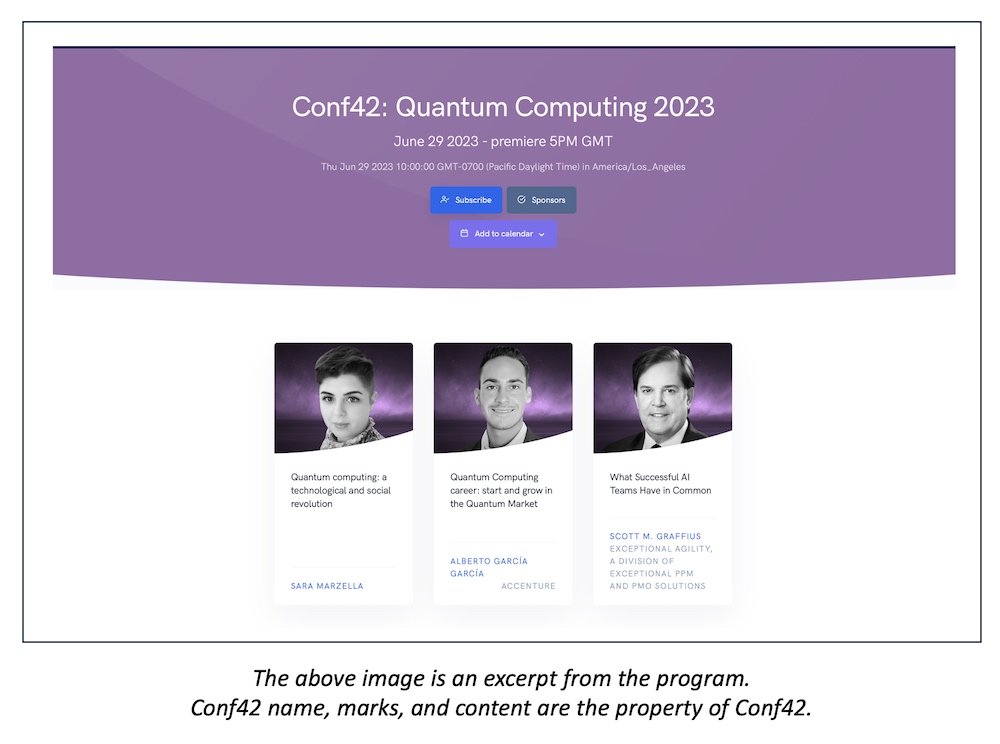




About Scott M. Graffius

Scott M. Graffius, PMP, SA, CSP-SM, CSP-PO, CSM, CSPO, SFE, ITIL, LSSGB is an agile project management practitioner, consultant, multi-award-winning author, and international keynote speaker. He is the Founder of Exceptional PPM and PMO Solutions™ and subsidiary Exceptional Agility™. He has generated over $1.9 billion of business value in aggregate for Global Fortune 500 businesses and other organizations he has served. Graffius and content from his books, talks, workshops, and more have been featured and used by businesses, professional associations, governments, and universities. Examples include Microsoft, Oracle, Broadcom, Cisco, Gartner, Project Management Institute, IEEE, Qantas, National Academy of Sciences, United States Department of Energy, New Zealand Ministry of Education, Yale University, Tufts University, and others. He has delighted audiences with dynamic and engaging talks and workshops on agile, project management, and technology (including AI) leadership at 86 conferences and other events across 25 countries.
His full bio is available here.
Connect with Scott on:


About Agile Scrum: Your Quick Start Guide with Step-by-Step Instructions

Shifting customer needs are common in today's marketplace. Businesses must be adaptive and responsive to change while delivering an exceptional customer experience to be competitive.
There are a variety of frameworks supporting the development of products and services, and most approaches fall into one of two broad categories: traditional or agile. Traditional practices such as waterfall engage sequential development, while agile involves iterative and incremental deliverables. Organizations are increasingly embracing agile to manage projects, and best meet their business needs of rapid response to change, fast delivery speed, and more.
With clear and easy to follow instructions, the multi award-winning Agile Scrum: Your Quick Start Guide with Step-by-Step Instructions book by Scott M. Graffius (Chris Hare and Colin Giffen, Technical Editors) helps the reader:
Hailed by Literary Titan as “the book highlights the versatility of Scrum beautifully.”
Winner of 17 first place awards.
Agile Scrum: Your Quick Start Guide with Step-by-Step Instructions is available in paperback and ebook/Kindle in the United States and around the world. Some links by country follow.

About Agile Transformation: A Brief Story of How an Entertainment Company Developed New Capabilities and Unlocked Business Agility to Thrive in an Era of Rapid Change

Thriving in today's marketplace frequently depends on making a transformation to become more agile. Those successful in the transition enjoy faster delivery speed and ROI, higher satisfaction, continuous improvement, and additional benefits.
Based on actual events, Agile Transformation: A Brief Story of How an Entertainment Company Developed New Capabilities and Unlocked Business Agility to Thrive in an Era of Rapid Change provides a quick (60-90 minute) read about a successful agile transformation at a multinational entertainment and media company, told from the author's perspective as an agile coach.
The award-winning book by Scott M. Graffius is available in paperback and ebook/Kindle in the United States and around the world. Some links by country follow.

The short URL for this article is: https://bit.ly/conf42
© Copyright 2023 Scott M. Graffius. All rights reserved. This material may not be published, broadcast, rewritten or redistributed without the express written permission of Scott M. Graffius.


Scott M. Graffius has delivered 86 talks and workshops at conferences and other events across 25 countries. His newest engagement will be at the Conf42 Quantum Computing 2023 Conference, where he'll present “What Successful AI Teams Have in Common.” The talk draws from his work on AI projects as well as research from the Association for the Advancement of Artificial Intelligence, Google, IBM, IEEE, Microsoft, MIT, Software Engineering Institute, United States Artificial Intelligence Institute, and many others.
The conference also includes talks by:
- Daniel Goldsmith,
- Michal Jankowski,
- Trista Pan,
- Myron Giannakis,
- Peter Den Haan,
- Roberto Magnani,
- Sara Marzella, and
- Alberto García García.
Details ↴
📍 Watch the Quantum Computing Conference online
🗓 June 29, 2023 at 10:00 a.m. PT | 5:00 p.m. GMT | 8:00 p.m. EET
🎟 Subscribe to watch at: https://bit.ly/1-signup




About Scott M. Graffius

Scott M. Graffius, PMP, SA, CSP-SM, CSP-PO, CSM, CSPO, SFE, ITIL, LSSGB is an agile project management practitioner, consultant, multi-award-winning author, and international keynote speaker. He is the Founder of Exceptional PPM and PMO Solutions™ and subsidiary Exceptional Agility™. He has generated over $1.9 billion of business value in aggregate for Global Fortune 500 businesses and other organizations he has served. Graffius and content from his books, talks, workshops, and more have been featured and used by businesses, professional associations, governments, and universities. Examples include Microsoft, Oracle, Broadcom, Cisco, Gartner, Project Management Institute, IEEE, Qantas, National Academy of Sciences, United States Department of Energy, New Zealand Ministry of Education, Yale University, Tufts University, and others. He has delighted audiences with dynamic and engaging talks and workshops on agile, project management, and technology (including AI) leadership at 86 conferences and other events across 25 countries.
His full bio is available here.
Connect with Scott on:


About Agile Scrum: Your Quick Start Guide with Step-by-Step Instructions

Shifting customer needs are common in today's marketplace. Businesses must be adaptive and responsive to change while delivering an exceptional customer experience to be competitive.
There are a variety of frameworks supporting the development of products and services, and most approaches fall into one of two broad categories: traditional or agile. Traditional practices such as waterfall engage sequential development, while agile involves iterative and incremental deliverables. Organizations are increasingly embracing agile to manage projects, and best meet their business needs of rapid response to change, fast delivery speed, and more.
With clear and easy to follow instructions, the multi award-winning Agile Scrum: Your Quick Start Guide with Step-by-Step Instructions book by Scott M. Graffius (Chris Hare and Colin Giffen, Technical Editors) helps the reader:
- Implement and use the most popular agile framework―Scrum;
- Deliver products in short cycles with rapid adaptation to change, fast time-to-market, and continuous improvement; and
- Support innovation and drive competitive advantage.
Hailed by Literary Titan as “the book highlights the versatility of Scrum beautifully.”
Winner of 17 first place awards.
Agile Scrum: Your Quick Start Guide with Step-by-Step Instructions is available in paperback and ebook/Kindle in the United States and around the world. Some links by country follow.
- 🇧🇷 Brazil
- 🇨🇦 Canada
- 🇨🇿 Czech Republic
- 🇩🇰 Denmark
- 🇫🇮 Finland
- 🇫🇷 France
- 🇩🇪 Germany
- 🇬🇷 Greece
- 🇭🇺 Hungary
- 🇮🇳 India
- 🇮🇪 Ireland
- 🇮🇱 Israel
- 🇮🇹 Italy
- 🇯🇵 Japan
- 🇱🇺 Luxembourg
- 🇲🇽 Mexico
- 🇳🇱 Netherlands
- 🇳🇿 New Zealand
- 🇳🇴 Norway
- 🇪🇸 Spain
- 🇸🇪 Sweden
- 🇨🇭 Switzerland
- 🇦🇪 UAE
- 🇬🇧 United Kingdom
- 🇺🇸 United States

About Agile Transformation: A Brief Story of How an Entertainment Company Developed New Capabilities and Unlocked Business Agility to Thrive in an Era of Rapid Change

Thriving in today's marketplace frequently depends on making a transformation to become more agile. Those successful in the transition enjoy faster delivery speed and ROI, higher satisfaction, continuous improvement, and additional benefits.
Based on actual events, Agile Transformation: A Brief Story of How an Entertainment Company Developed New Capabilities and Unlocked Business Agility to Thrive in an Era of Rapid Change provides a quick (60-90 minute) read about a successful agile transformation at a multinational entertainment and media company, told from the author's perspective as an agile coach.
The award-winning book by Scott M. Graffius is available in paperback and ebook/Kindle in the United States and around the world. Some links by country follow.
- 🇦🇺 Australia
- 🇦🇹 Austria
- 🇧🇷 Brazil
- 🇨🇦 Canada
- 🇨🇿 Czech Republic
- 🇩🇰 Denmark
- 🇫🇮 Finland
- 🇫🇷 France
- 🇩🇪 Germany
- 🇬🇷 Greece
- 🇮🇳 India
- 🇮🇪 Ireland
- 🇯🇵 Japan
- 🇱🇺 Luxembourg
- 🇲🇽 Mexico
- 🇳🇱 Netherlands
- 🇳🇿 New Zealand
- 🇪🇸 Spain
- 🇸🇪 Sweden
- 🇨🇭 Switzerland
- 🇦🇪 United Arab Emirates
- 🇬🇧 United Kingdom
- 🇺🇸 United States

The short URL for this article is: https://bit.ly/conf42
© Copyright 2023 Scott M. Graffius. All rights reserved. This material may not be published, broadcast, rewritten or redistributed without the express written permission of Scott M. Graffius.

Top 5 Roles on AI Teams
09 October 2023
BY SCOTT M. GRAFFIUS | ScottGraffius.com
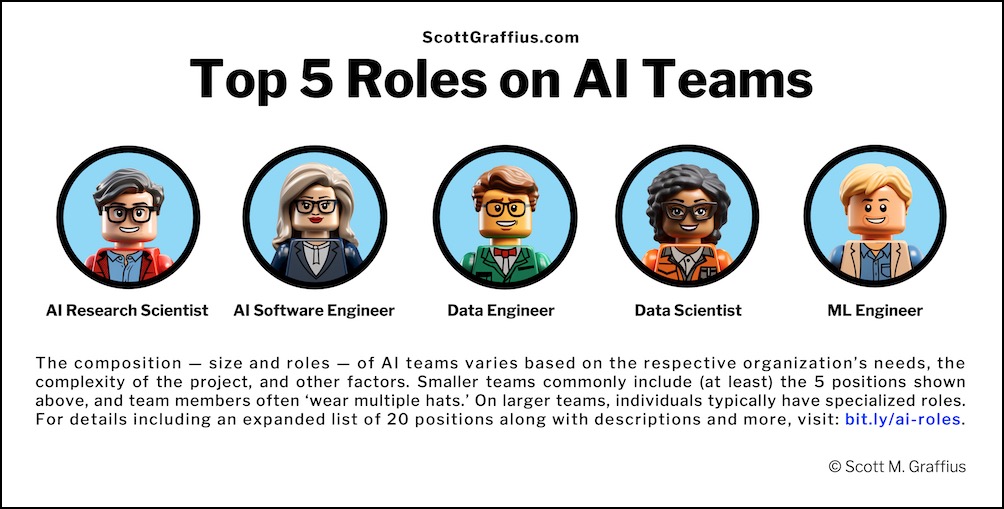
Select here to download a PDF of this article.

Effective Artificial Intelligence (AI) teams leverage critical hard skills and soft skills to develop and deliver successful AI products, including innovative solutions that address real-world challenges and have a positive impact on the world. (If you’d like to learn about the critical skills leveraged by effective AI teams, select here for our popular article on the topic.) This article focuses on the roles on AI teams.

The composition (size and roles) of AI teams varies by organization based on the respective company’s needs, the nature of the AI endeavor including complexity, and other factors. However, AI teams commonly include (at least these) five positions. Here are the five along with brief descriptions, listed in alphabetical order:
The above five roles collectively cover key aspects of AI development — from research and model creation to data management and software integration. Depending on requirements and characteristics (such as degree of complexity), additional positions may be needed.
An expanded list of 20 roles common to AI teams follow. Here are the aforementioned 5 and 15 additional positions, listed in alphabetical order:
The composition (size and roles) of AI teams varies, based on the complexity of the AI project and other factors. On smaller teams, individuals often ‘wear multiple hats.’ On larger teams, individuals typically have more specialized roles.

This article covered the roles common to AI teams. Listings are not exhaustive of all potential positions. Additionally, as the field of AI continues to evolve and advance, new roles may materialize to address emerging challenges and opportunities.
(If you’d like to learn about the critical skills leveraged by successful AI teams, select here for our popular article on the topic.)

References/Sources
All of the supplied links were functional when this article was published.

How to Cite This Article
Graffius, Scott M. (2023, October 9). Top 5 Roles on AI Teams. Available at: https://scottgraffius.com/blog/files/ai-team-roles.html. DOI: 10.13140/RG.2.2.34857.57449.





About Scott M. Graffius

Scott M. Graffius, PMP, SA, CSP-SM, CSP-PO, CSM, CSPO, SFE, ITIL, LSSGB is an agile project management practitioner, consultant, multi-award-winning author, and international keynote speaker. He is the Founder of Exceptional PPM and PMO Solutions™ and subsidiary Exceptional Agility™. He has generated over $1.9 billion of business value in aggregate for Global Fortune 500 businesses and other organizations he has served. Graffius and content from his books, talks, workshops, and more have been featured and used by businesses, professional associations, governments, and universities. Examples include Microsoft, Oracle, Broadcom, Cisco, Gartner, Project Management Institute, IEEE, Qantas, National Academy of Sciences, United States Department of Energy, New Zealand Ministry of Education, Yale University, Tufts University, and others. He has delighted audiences with dynamic and engaging talks and workshops on agile, project management, and technology (including AI, GameDev, and more) leadership at 87 conferences and other events across 25 countries.
His full bio is available here.
Connect with Scott on:


About Agile Scrum: Your Quick Start Guide with Step-by-Step Instructions

Shifting customer needs are common in today's marketplace. Businesses must be adaptive and responsive to change while delivering an exceptional customer experience to be competitive.
There are a variety of frameworks supporting the development of products and services, and most approaches fall into one of two broad categories: traditional or agile. Traditional practices such as waterfall engage sequential development, while agile involves iterative and incremental deliverables. Organizations are increasingly embracing agile to manage projects, and best meet their business needs of rapid response to change, fast delivery speed, and more.
With clear and easy to follow instructions, the multi award-winning Agile Scrum: Your Quick Start Guide with Step-by-Step Instructions book by Scott M. Graffius (Chris Hare and Colin Giffen, Technical Editors) helps the reader:
Hailed by Literary Titan as “the book highlights the versatility of Scrum beautifully.”
Winner of 17 first place awards.
Agile Scrum: Your Quick Start Guide with Step-by-Step Instructions is available in paperback and ebook/Kindle in the United States and around the world. Some links by country follow.

About Agile Transformation: A Brief Story of How an Entertainment Company Developed New Capabilities and Unlocked Business Agility to Thrive in an Era of Rapid Change

Thriving in today's marketplace frequently depends on making a transformation to become more agile. Those successful in the transition enjoy faster delivery speed and ROI, higher satisfaction, continuous improvement, and additional benefits.
Based on actual events, Agile Transformation: A Brief Story of How an Entertainment Company Developed New Capabilities and Unlocked Business Agility to Thrive in an Era of Rapid Change provides a quick (60-90 minute) read about a successful agile transformation at a multinational entertainment and media company, told from the author's perspective as an agile coach.
The award-winning book by Scott M. Graffius is available in paperback and ebook/Kindle in the United States and around the world. Some links by country follow.

The short link for this article is: https://bit.ly/ai-roles.
© Copyright 2023 Scott M. Graffius. All rights reserved. This material may not be published, broadcast, rewritten or redistributed without the express written permission of Scott M. Graffius.


Select here to download a PDF of this article.

Effective Artificial Intelligence (AI) teams leverage critical hard skills and soft skills to develop and deliver successful AI products, including innovative solutions that address real-world challenges and have a positive impact on the world. (If you’d like to learn about the critical skills leveraged by effective AI teams, select here for our popular article on the topic.) This article focuses on the roles on AI teams.

The composition (size and roles) of AI teams varies by organization based on the respective company’s needs, the nature of the AI endeavor including complexity, and other factors. However, AI teams commonly include (at least these) five positions. Here are the five along with brief descriptions, listed in alphabetical order:
- AI Research Scientist: AI research scientists are responsible for conducting research and developing cutting-edge AI algorithms and models.
- AI Software Engineer: AI software engineers are responsible for integrating AI components into software applications. They bridge the gap between AI research and practical implementation, making AI systems usable by end-users.
- Data Engineer: Data engineers are responsible for building and managing the data pipelines that feed AI models. They ensure that data is collected, cleaned, and prepared in a format suitable for analysis and model training.
- Data Scientist: Data scientists are experts in data analysis and interpretation. They preprocess, analyze, and extract valuable insights from data, which is vital for training and improving AI models.
- Machine Learning Engineer: Machine learning engineers focus on implementing and deploying machine learning models into practical applications. They work to ensure that AI models are integrated into software systems effectively.
The above five roles collectively cover key aspects of AI development — from research and model creation to data management and software integration. Depending on requirements and characteristics (such as degree of complexity), additional positions may be needed.
An expanded list of 20 roles common to AI teams follow. Here are the aforementioned 5 and 15 additional positions, listed in alphabetical order:
- AI DevOps Engineer: Combines development and operations skills to streamline AI model deployment. They automate tasks.
- AI Ethicist: Ensures that AI systems are developed and used responsibly and ethically.
- AI Infrastructure Engineer: Builds and maintains the infrastructure required for AI model deployment and scalability.
- AI Legal and Compliance Specialist: Ensures AI projects comply with legal and regulatory requirements.
- AI Marketing Specialist: Promotes and markets AI products and solutions to customers and stakeholders.
- AI Operations (AIOps) Specialist: Focuses on the operational aspects of AI, including monitoring, maintenance, and troubleshooting.
- AI Product Manager: Oversees the development and deployment of AI products.
- AI Project Manager: Leverages general and specialized hard skills and soft skills, and applies their understanding of many aspects of artificial intelligence (such as machine learning, deep learning, automation, robotics, and natural language processing) to manage the planning, execution, and delivery of AI projects. Note: Titles vary by organization; the position may be called an AI Project Manager, AI Program Manager, Agile Project Manager, Technical Project Manager, Scrum Master, or another related designation.
- AI QA Engineer: Ensures the quality and reliability of AI models through testing and validation.
- AI Research Scientist: Conducts research to develop new AI algorithms and models.
- AI Software Engineer: Builds and maintains software systems that incorporate AI components.
- AI Trainer/Annotator: Prepares and labels data for training AI models, especially for supervised learning.
- AI UX/UI Designer: Designs user interfaces and experiences for AI-powered applications.
- Computer Vision Engineer: Specializes in developing AI models for image and video analysis.
- Data Analyst: Examines data to uncover trends and insights that can guide AI projects.
- Data Engineer: Manages data pipelines and prepares data for analysis and model training.
- Data Scientist: Analyzes and interprets data to extract insights and inform AI models.
- Deep Learning Engineer: Focuses on deep neural networks and architectures.
- Machine Learning Engineer: Focuses on implementing and deploying machine learning models.
- Natural Language Processing (NLP) Engineer: Specializes in working with text and language-related AI tasks.
The composition (size and roles) of AI teams varies, based on the complexity of the AI project and other factors. On smaller teams, individuals often ‘wear multiple hats.’ On larger teams, individuals typically have more specialized roles.

This article covered the roles common to AI teams. Listings are not exhaustive of all potential positions. Additionally, as the field of AI continues to evolve and advance, new roles may materialize to address emerging challenges and opportunities.
(If you’d like to learn about the critical skills leveraged by successful AI teams, select here for our popular article on the topic.)

References/Sources
All of the supplied links were functional when this article was published.
- Apple (n.d.). Careers at Apple: Machine Learning and AI. Available at: https://www.apple.com/careers/us/machine-learning-and-ai.html.
- Deloitte AI Institute (2021). Building Successful AI Teams. Available at: https://www2.deloitte.com/content/dam/Deloitte/us/Documents/deloitte-analytics/us-ai-institute-building-successful-AI-teams.pdf.
- Gartner (2020, December 15). Staff AI Teams with Various Roles and Skills for Success. Available at: https://www.gartner.com/smarterwithgartner/how-to-staff-your-ai-team.
- General Services Administration (GSA) Centers of Excellence (CoE) (n.d.). AI Guide for Government. Available at: https://coe.gsa.gov/coe/ai-guide-for-government/understanding-ai-job-roles-career-path/.
- Google Quantum AI (n.d.). Careers. Available at: https://quantumai.google/team/careers.
- Graffius, Scott M. (2023, May 1). AI is a Team Sport: A Confluence of Diverse Technical and Soft Skills are Crucial for Success. Available at: https://www.scottgraffius.com/blog/files/successful-ai-teams.html.
- Graffius, Scott M. (2023). What Successful AI Teams Have in Common [Video]. Graffius’ talk at the 2023 Conf42 Quantum Computer Conference. Available at: https://www.youtube.com/watch?v=u2qRKFbSKYE.
- IBM (n.d.). Assemble the Team to Support a Data-Driven Project. Available at: https://www.ibm.com/garage/method/practices/culture/assemble-team-for-data-driven-project/.
- Intel (n.d.). Artificial Intelligence Teams: Careers. Available at: https://jobs.intel.com/en/search-jobs/artificial+intelligence/599/1.
- Intuit (2020, December 8). How to avoid conflicts and delays in the AI development process (Part I). Available at: https://blogs.intuit.com/2020/12/08/how-to-avoid-conflicts-and-delays-in-the-ai-development-process-part-i/.

How to Cite This Article
Graffius, Scott M. (2023, October 9). Top 5 Roles on AI Teams. Available at: https://scottgraffius.com/blog/files/ai-team-roles.html. DOI: 10.13140/RG.2.2.34857.57449.



About Scott M. Graffius

Scott M. Graffius, PMP, SA, CSP-SM, CSP-PO, CSM, CSPO, SFE, ITIL, LSSGB is an agile project management practitioner, consultant, multi-award-winning author, and international keynote speaker. He is the Founder of Exceptional PPM and PMO Solutions™ and subsidiary Exceptional Agility™. He has generated over $1.9 billion of business value in aggregate for Global Fortune 500 businesses and other organizations he has served. Graffius and content from his books, talks, workshops, and more have been featured and used by businesses, professional associations, governments, and universities. Examples include Microsoft, Oracle, Broadcom, Cisco, Gartner, Project Management Institute, IEEE, Qantas, National Academy of Sciences, United States Department of Energy, New Zealand Ministry of Education, Yale University, Tufts University, and others. He has delighted audiences with dynamic and engaging talks and workshops on agile, project management, and technology (including AI, GameDev, and more) leadership at 87 conferences and other events across 25 countries.
His full bio is available here.
Connect with Scott on:


About Agile Scrum: Your Quick Start Guide with Step-by-Step Instructions

Shifting customer needs are common in today's marketplace. Businesses must be adaptive and responsive to change while delivering an exceptional customer experience to be competitive.
There are a variety of frameworks supporting the development of products and services, and most approaches fall into one of two broad categories: traditional or agile. Traditional practices such as waterfall engage sequential development, while agile involves iterative and incremental deliverables. Organizations are increasingly embracing agile to manage projects, and best meet their business needs of rapid response to change, fast delivery speed, and more.
With clear and easy to follow instructions, the multi award-winning Agile Scrum: Your Quick Start Guide with Step-by-Step Instructions book by Scott M. Graffius (Chris Hare and Colin Giffen, Technical Editors) helps the reader:
- Implement and use the most popular agile framework―Scrum;
- Deliver products in short cycles with rapid adaptation to change, fast time-to-market, and continuous improvement; and
- Support innovation and drive competitive advantage.
Hailed by Literary Titan as “the book highlights the versatility of Scrum beautifully.”
Winner of 17 first place awards.
Agile Scrum: Your Quick Start Guide with Step-by-Step Instructions is available in paperback and ebook/Kindle in the United States and around the world. Some links by country follow.
- 🇧🇷 Brazil
- 🇨🇦 Canada
- 🇨🇿 Czech Republic
- 🇩🇰 Denmark
- 🇫🇮 Finland
- 🇫🇷 France
- 🇩🇪 Germany
- 🇬🇷 Greece
- 🇭🇺 Hungary
- 🇮🇳 India
- 🇮🇪 Ireland
- 🇮🇱 Israel
- 🇮🇹 Italy
- 🇯🇵 Japan
- 🇱🇺 Luxembourg
- 🇲🇽 Mexico
- 🇳🇱 Netherlands
- 🇳🇿 New Zealand
- 🇳🇴 Norway
- 🇪🇸 Spain
- 🇸🇪 Sweden
- 🇨🇭 Switzerland
- 🇦🇪 UAE
- 🇬🇧 United Kingdom
- 🇺🇸 United States

About Agile Transformation: A Brief Story of How an Entertainment Company Developed New Capabilities and Unlocked Business Agility to Thrive in an Era of Rapid Change

Thriving in today's marketplace frequently depends on making a transformation to become more agile. Those successful in the transition enjoy faster delivery speed and ROI, higher satisfaction, continuous improvement, and additional benefits.
Based on actual events, Agile Transformation: A Brief Story of How an Entertainment Company Developed New Capabilities and Unlocked Business Agility to Thrive in an Era of Rapid Change provides a quick (60-90 minute) read about a successful agile transformation at a multinational entertainment and media company, told from the author's perspective as an agile coach.
The award-winning book by Scott M. Graffius is available in paperback and ebook/Kindle in the United States and around the world. Some links by country follow.
- 🇦🇺 Australia
- 🇦🇹 Austria
- 🇧🇷 Brazil
- 🇨🇦 Canada
- 🇨🇿 Czech Republic
- 🇩🇰 Denmark
- 🇫🇮 Finland
- 🇫🇷 France
- 🇩🇪 Germany
- 🇬🇷 Greece
- 🇮🇳 India
- 🇮🇪 Ireland
- 🇯🇵 Japan
- 🇱🇺 Luxembourg
- 🇲🇽 Mexico
- 🇳🇱 Netherlands
- 🇳🇿 New Zealand
- 🇪🇸 Spain
- 🇸🇪 Sweden
- 🇨🇭 Switzerland
- 🇦🇪 United Arab Emirates
- 🇬🇧 United Kingdom
- 🇺🇸 United States

The short link for this article is: https://bit.ly/ai-roles.
© Copyright 2023 Scott M. Graffius. All rights reserved. This material may not be published, broadcast, rewritten or redistributed without the express written permission of Scott M. Graffius.

IEEE Xplore Publication Featured Scott M. Graffius' 'Phases of Team Development' Work
27 October 2023
BY SCOTT M. GRAFFIUS | ScottGraffius.com
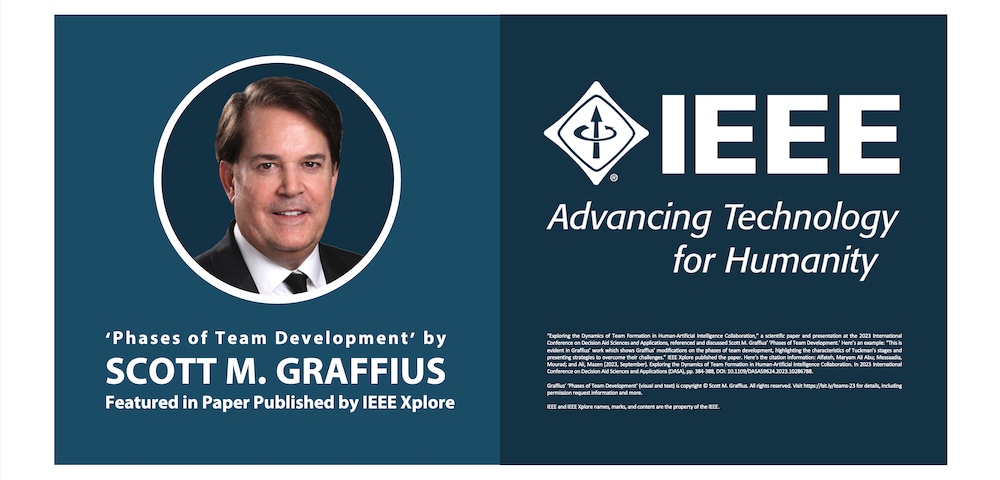
The scientific paper, “Exploring the Dynamics of Team Formation in Human-Artificial Intelligence Collaboration,” referenced and discussed Scott M. Graffius’ ‘Phases of Team Development’ work.
“Exploring the Dynamics of Team Formation in Human-Artificial Intelligence Collaboration” — a scientific paper and presentation at the 2023 International Conference on Decision Aid Sciences and Applications — referenced and discussed Graffius’ ‘Phases of Team Development.’ Here’s an excerpt: “This is evident in Graffius’ work which shows Graffius’ modifications on the phases of team development, highlighting the characteristics of Tuckman’s stages and presenting strategies to overcome their challenges.”
IEEE Xplore published the paper (here). Here’s the citation information:
Alfateh, Maryam Ali Abu; Messaadia, Mourad; and Ali, Mazen (2023, September). Exploring the Dynamics of Team Formation in Human-Artificial Intelligence Collaboration. In 2023 International Conference on Decision Aid Sciences and Applications (DASA), pp. 384-388. DOI: 10.1109/DASA59624.2023.10286788.
About Scott M. Graffius’ ‘Phases of Team Development’
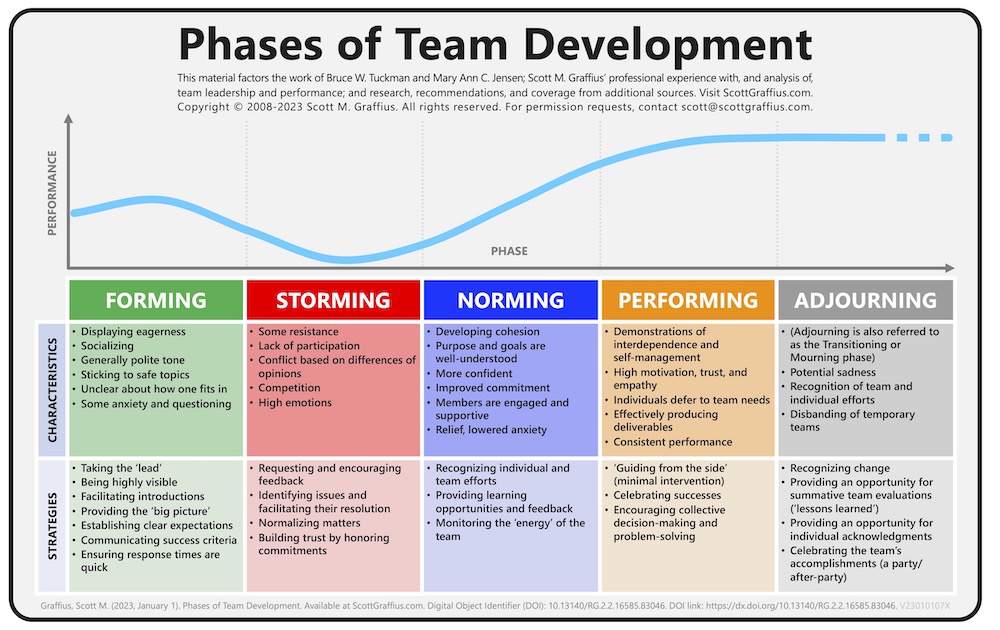
Informed by the research of Bruce W. Tuckman and Mary Ann C. Jensen, over 100 subsequent studies, and Graffius’ first-hand professional experience with, and analysis of, team leadership and performance, Graffius created his ‘Phases of Team Development’ as a unique perspective and visual conveying the five phases of team development — Forming, Storming, Norming, Performing, and Adjourning — inclusive of a graph showing how performance varies by phase, as well as the characteristics and strategies for each phase.
With permission/a license from Graffius, his ‘Phases of Team Development’ work is used by businesses, professional associations, governments, and universities around the world. Examples include Yale University, IEEE, Torrens University Australia, UK Sports Institute, Adobe, Amsterdam Public Health Research Institute, Academic Cooperation Association, Boston University, U.S. National Park Service, Bayer, Hasso Plattner Institute (Hasso-Plattner-Institut für Digital Engineering GmbH), Singapore University of Social Sciences, New Zealand Government, University of Galway Ireland, and many more.
Visit https://bit.ly/teams-23 for details, including permission request information and more.
Graffius’ ‘Phases of Team Development’ (visual and text) is copyright © Scott M. Graffius. All rights reserved.
About the IEEE
The Institute of Electrical and Electronics Engineers (IEEE) is the world’s largest professional organization advancing innovation and technological excellence for the benefit of humanity. IEEE and its members (which includes Graffius) inspire a global community to innovate for a better tomorrow through its highly cited publications, conferences, technology standards, and professional and educational activities. IEEE is the trusted “voice” for engineering, computing, and technology information around the globe. Visit https://ieee.org to learn more.
IEEE name, mark, and content are the property of the IEEE.
About IEEE Xplore
IEEE Xplore is the flagship digital platform for discovery and access to scientific and technical content published by the IEEE and its publishing partners. Visit https://innovate.ieee.org to learn more.
IEEE Xplore name, mark, and content are the property of the IEEE.





About Scott M. Graffius

Scott M. Graffius, PMP, SA, CSP-SM, CSP-PO, CSM, CSPO, SFE, ITIL, LSSGB is an agile project management practitioner, consultant, multi-award-winning author, and international keynote speaker. He is the Founder of Exceptional PPM and PMO Solutions™ and subsidiary Exceptional Agility™. He has generated over $1.9 billion of business value in aggregate for Global Fortune 500 businesses and other organizations he has served. Graffius and content from his books, talks, workshops, and more have been featured and used by businesses, professional associations, governments, and universities. Examples include Microsoft, Oracle, Broadcom, Cisco, Gartner, Project Management Institute, IEEE, Qantas, National Academy of Sciences, United States Department of Energy, New Zealand Ministry of Education, Yale University, Tufts University, and others. He has delighted audiences with dynamic and engaging talks and workshops at 88 conferences and other events across 25 countries.
His full bio is available here.
Connect with Scott on:


About Agile Scrum: Your Quick Start Guide with Step-by-Step Instructions

Shifting customer needs are common in today's marketplace. Businesses must be adaptive and responsive to change while delivering an exceptional customer experience to be competitive.
There are a variety of frameworks supporting the development of products and services, and most approaches fall into one of two broad categories: traditional or agile. Traditional practices such as waterfall engage sequential development, while agile involves iterative and incremental deliverables. Organizations are increasingly embracing agile to manage projects, and best meet their business needs of rapid response to change, fast delivery speed, and more.
With clear and easy to follow instructions, the multi award-winning Agile Scrum: Your Quick Start Guide with Step-by-Step Instructions book by Scott M. Graffius (Chris Hare and Colin Giffen, Technical Editors) helps the reader:
Hailed by Literary Titan as “the book highlights the versatility of Scrum beautifully.”
Winner of 17 first place awards.
Agile Scrum: Your Quick Start Guide with Step-by-Step Instructions is available in paperback and ebook/Kindle in the United States and around the world. Some links by country follow.

About Agile Transformation: A Brief Story of How an Entertainment Company Developed New Capabilities and Unlocked Business Agility to Thrive in an Era of Rapid Change

Thriving in today's marketplace frequently depends on making a transformation to become more agile. Those successful in the transition enjoy faster delivery speed and ROI, higher satisfaction, continuous improvement, and additional benefits.
Based on actual events, Agile Transformation: A Brief Story of How an Entertainment Company Developed New Capabilities and Unlocked Business Agility to Thrive in an Era of Rapid Change provides a quick (60-90 minute) read about a successful agile transformation at a multinational entertainment and media company, told from the author's perspective as an agile coach.
The award-winning book by Scott M. Graffius is available in paperback and ebook/Kindle in the United States and around the world. Some links by country follow.

© Copyright 2023 Scott M. Graffius. All rights reserved. This material may not be published, broadcast, rewritten or redistributed without the express written permission of Scott M. Graffius.


The scientific paper, “Exploring the Dynamics of Team Formation in Human-Artificial Intelligence Collaboration,” referenced and discussed Scott M. Graffius’ ‘Phases of Team Development’ work.
“Exploring the Dynamics of Team Formation in Human-Artificial Intelligence Collaboration” — a scientific paper and presentation at the 2023 International Conference on Decision Aid Sciences and Applications — referenced and discussed Graffius’ ‘Phases of Team Development.’ Here’s an excerpt: “This is evident in Graffius’ work which shows Graffius’ modifications on the phases of team development, highlighting the characteristics of Tuckman’s stages and presenting strategies to overcome their challenges.”
IEEE Xplore published the paper (here). Here’s the citation information:
Alfateh, Maryam Ali Abu; Messaadia, Mourad; and Ali, Mazen (2023, September). Exploring the Dynamics of Team Formation in Human-Artificial Intelligence Collaboration. In 2023 International Conference on Decision Aid Sciences and Applications (DASA), pp. 384-388. DOI: 10.1109/DASA59624.2023.10286788.
About Scott M. Graffius’ ‘Phases of Team Development’

Informed by the research of Bruce W. Tuckman and Mary Ann C. Jensen, over 100 subsequent studies, and Graffius’ first-hand professional experience with, and analysis of, team leadership and performance, Graffius created his ‘Phases of Team Development’ as a unique perspective and visual conveying the five phases of team development — Forming, Storming, Norming, Performing, and Adjourning — inclusive of a graph showing how performance varies by phase, as well as the characteristics and strategies for each phase.
With permission/a license from Graffius, his ‘Phases of Team Development’ work is used by businesses, professional associations, governments, and universities around the world. Examples include Yale University, IEEE, Torrens University Australia, UK Sports Institute, Adobe, Amsterdam Public Health Research Institute, Academic Cooperation Association, Boston University, U.S. National Park Service, Bayer, Hasso Plattner Institute (Hasso-Plattner-Institut für Digital Engineering GmbH), Singapore University of Social Sciences, New Zealand Government, University of Galway Ireland, and many more.
Visit https://bit.ly/teams-23 for details, including permission request information and more.
Graffius’ ‘Phases of Team Development’ (visual and text) is copyright © Scott M. Graffius. All rights reserved.
About the IEEE
The Institute of Electrical and Electronics Engineers (IEEE) is the world’s largest professional organization advancing innovation and technological excellence for the benefit of humanity. IEEE and its members (which includes Graffius) inspire a global community to innovate for a better tomorrow through its highly cited publications, conferences, technology standards, and professional and educational activities. IEEE is the trusted “voice” for engineering, computing, and technology information around the globe. Visit https://ieee.org to learn more.
IEEE name, mark, and content are the property of the IEEE.
About IEEE Xplore
IEEE Xplore is the flagship digital platform for discovery and access to scientific and technical content published by the IEEE and its publishing partners. Visit https://innovate.ieee.org to learn more.
IEEE Xplore name, mark, and content are the property of the IEEE.



About Scott M. Graffius

Scott M. Graffius, PMP, SA, CSP-SM, CSP-PO, CSM, CSPO, SFE, ITIL, LSSGB is an agile project management practitioner, consultant, multi-award-winning author, and international keynote speaker. He is the Founder of Exceptional PPM and PMO Solutions™ and subsidiary Exceptional Agility™. He has generated over $1.9 billion of business value in aggregate for Global Fortune 500 businesses and other organizations he has served. Graffius and content from his books, talks, workshops, and more have been featured and used by businesses, professional associations, governments, and universities. Examples include Microsoft, Oracle, Broadcom, Cisco, Gartner, Project Management Institute, IEEE, Qantas, National Academy of Sciences, United States Department of Energy, New Zealand Ministry of Education, Yale University, Tufts University, and others. He has delighted audiences with dynamic and engaging talks and workshops at 88 conferences and other events across 25 countries.
His full bio is available here.
Connect with Scott on:


About Agile Scrum: Your Quick Start Guide with Step-by-Step Instructions

Shifting customer needs are common in today's marketplace. Businesses must be adaptive and responsive to change while delivering an exceptional customer experience to be competitive.
There are a variety of frameworks supporting the development of products and services, and most approaches fall into one of two broad categories: traditional or agile. Traditional practices such as waterfall engage sequential development, while agile involves iterative and incremental deliverables. Organizations are increasingly embracing agile to manage projects, and best meet their business needs of rapid response to change, fast delivery speed, and more.
With clear and easy to follow instructions, the multi award-winning Agile Scrum: Your Quick Start Guide with Step-by-Step Instructions book by Scott M. Graffius (Chris Hare and Colin Giffen, Technical Editors) helps the reader:
- Implement and use the most popular agile framework―Scrum;
- Deliver products in short cycles with rapid adaptation to change, fast time-to-market, and continuous improvement; and
- Support innovation and drive competitive advantage.
Hailed by Literary Titan as “the book highlights the versatility of Scrum beautifully.”
Winner of 17 first place awards.
Agile Scrum: Your Quick Start Guide with Step-by-Step Instructions is available in paperback and ebook/Kindle in the United States and around the world. Some links by country follow.
- 🇧🇷 Brazil
- 🇨🇦 Canada
- 🇨🇿 Czech Republic
- 🇩🇰 Denmark
- 🇫🇮 Finland
- 🇫🇷 France
- 🇩🇪 Germany
- 🇬🇷 Greece
- 🇭🇺 Hungary
- 🇮🇳 India
- 🇮🇪 Ireland
- 🇮🇱 Israel
- 🇮🇹 Italy
- 🇯🇵 Japan
- 🇱🇺 Luxembourg
- 🇲🇽 Mexico
- 🇳🇱 Netherlands
- 🇳🇿 New Zealand
- 🇳🇴 Norway
- 🇪🇸 Spain
- 🇸🇪 Sweden
- 🇨🇭 Switzerland
- 🇦🇪 UAE
- 🇬🇧 United Kingdom
- 🇺🇸 United States

About Agile Transformation: A Brief Story of How an Entertainment Company Developed New Capabilities and Unlocked Business Agility to Thrive in an Era of Rapid Change

Thriving in today's marketplace frequently depends on making a transformation to become more agile. Those successful in the transition enjoy faster delivery speed and ROI, higher satisfaction, continuous improvement, and additional benefits.
Based on actual events, Agile Transformation: A Brief Story of How an Entertainment Company Developed New Capabilities and Unlocked Business Agility to Thrive in an Era of Rapid Change provides a quick (60-90 minute) read about a successful agile transformation at a multinational entertainment and media company, told from the author's perspective as an agile coach.
The award-winning book by Scott M. Graffius is available in paperback and ebook/Kindle in the United States and around the world. Some links by country follow.
- 🇦🇺 Australia
- 🇦🇹 Austria
- 🇧🇷 Brazil
- 🇨🇦 Canada
- 🇨🇿 Czech Republic
- 🇩🇰 Denmark
- 🇫🇮 Finland
- 🇫🇷 France
- 🇩🇪 Germany
- 🇬🇷 Greece
- 🇮🇳 India
- 🇮🇪 Ireland
- 🇯🇵 Japan
- 🇱🇺 Luxembourg
- 🇲🇽 Mexico
- 🇳🇱 Netherlands
- 🇳🇿 New Zealand
- 🇪🇸 Spain
- 🇸🇪 Sweden
- 🇨🇭 Switzerland
- 🇦🇪 United Arab Emirates
- 🇬🇧 United Kingdom
- 🇺🇸 United States

© Copyright 2023 Scott M. Graffius. All rights reserved. This material may not be published, broadcast, rewritten or redistributed without the express written permission of Scott M. Graffius.

